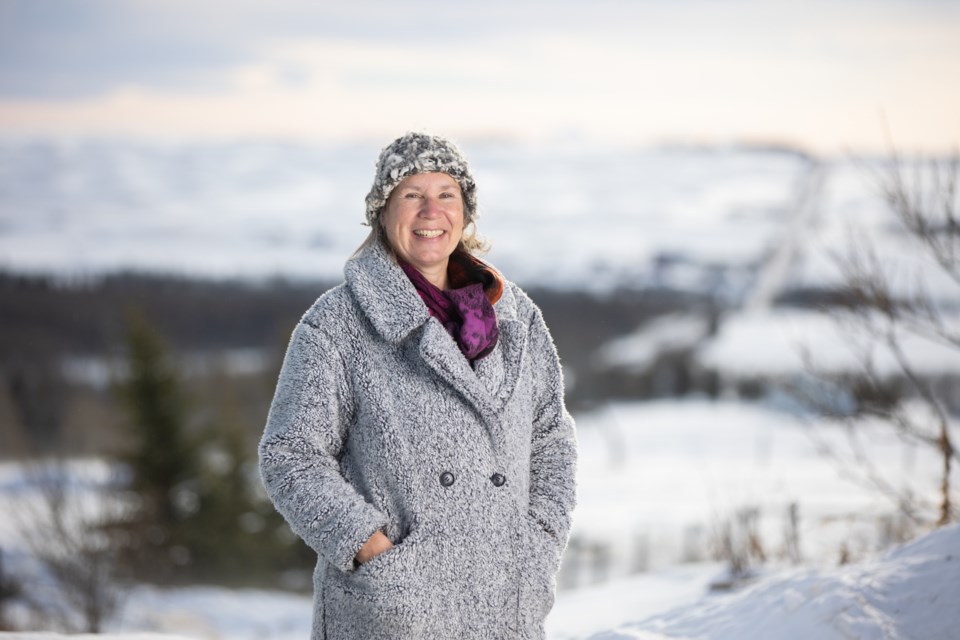A member of the Black Diamond community is hoping to break the ice with conversation about mental health this winter.
As part of a pilot project that kicked off on Jan. 4 through Black Diamond’s Family and Community Support Services, Riny de Jonge hopes to create discussions around mental wellness as a fact of daily life in rural areas.
Dubbed a “Community Animator”, de Jonge’s volunteer role will be to invite and seek conversations to identify specific needs within Black Diamond’s community.
As part of the Rural Mental Health Project organized by the Canadian Mental Health Association, 150 rural communities around Alberta are tasking a community animator to explore needs and initiatives that will best benefit the area, recognizing that each community’s needs are different.
“The idea is to get and bring people together so that we get the discussion going,” said de Jonge.
She recognizes the stigma around discussing mental wellness is real, but something that can often be easily ignored unless it is serious.
“If you use the words ‘mental health’, people say, ‘Oh, something's off,’” she said.
She likened the subject to physical fitness, which many consider daily.
“In comparison with physical health, you can be reasonably fit or an athlete and everything in between and beyond,” she said. “It starts with being aware to get exercise in, how far you want to take it is up to you — same for mental health.
“Are you okay with just being able to go through your daily motions or do you need more out of life and aim to flourish rather than getting by?
“Self-awareness, self knowledge, self-compassion all come into play.
“What we want to introduce is that it's okay to discuss what's on your mind, in order to almost prevent people ending up in a doctor's office.”
de Jonge, a social worker by trade, recognizes each community has unique needs.
“There's a difference between rural and urban, that's for sure," she said. “They don't talk about things, so there’s a difference there, but there's also differences from one community to the other.
“So if you go to Okotoks or Black Diamond, you might find different needs. So I think it basically all comes down to what are you as a community, what are our strengths and how can we use this in connection with personal well-being?”
de Jonge said evolving the project with community input is an important aspect.
“We'll see where we're going. It would be very easy for me to write a plan and say, ‘This is what we're gonna do this full year to make sure that people talk about mental health and things are getting better,’ but that will be upside down,” she said.
“What we want is to have this from the ground up.”
Black Diamond FCSS co-ordinator Suzan Nagel said the community’s involvement in the project is crucial.
“We don't want it to be run just by professionals — there's a lot of individuals who have great experiences to bring to the table and come up with their own solutions for challenging times and that sort of thing,” Nagel said. “And also, seniors are a great group of people to draw on for their various lifelong experience.
“So that's the idea with FCSS is to try and keep the group as well rounded and equal in participation as possible.
“As FCSS is supporting the animator, the animator, their job is to build relationships and facilitate these conversations... And hopefully they can identify those areas and those priorities and help identify opportunities that can expand capacity.”
de Jonge added that it may help identify how current supports are working and where additional help may be needed.
“So maybe at the end of this year, we'll say we're doing great and everyone feels comfortable talking about their issues. Let's keep doing what we're doing. That's great," de Jonge said. “Or maybe other things will show up like, ‘We're really dropping the ball.'
"We have all these services, but people stay home. They don't feel encouraged to make use of them or they feel barriers or maybe they're on waiting lists.
“We need to hear back from the community and then we can build from there.”
de Jonge, who lost an uncle and cousin to suicide, pointed out that often, many people don’t indicate that they are unwell before things get bad.
The project, which was planned before the COVID-19 pandemic, was slated to begin with in-person meetings and group discussions.
Adapting to the crisis, the project will start with an email address to which residents can reach out with ideas and suggestions.
“It's come with its challenges, because of the timing of that,” Nagel said.
“But it's also, on the flip side, the timing of this couldn't be better, because this is a time when these kinds of conversations really need to be had and people are struggling.
“And they do need to find ways to strengthen the community, find where they can get help, or just support of any kind and also to know that it's okay to need help, and it's okay to ask for help,” she said.
“That's the best thing we can do for each other is to make sure that we're taking care of ourselves.
The project's end date is Oct. 31, when it will be evaluated and consideration given as to whether it will be extended.
The project invites Black Diamond residents to share their ideas and suggestions around mental health by email to [email protected]
While the project is focused on discussing mental wellness, it is not intended to respond to crisis situations. Anyone who is experiencing suicidal thoughts is encouraged to contact the Canada Suicide Prevention Service online at www.crisisservicescanada.ca or by phone 24 hours a day at 1-833-456-4566, or text 45645.




